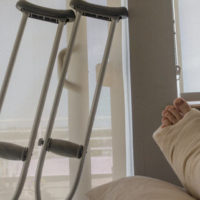What Happens When an Injury Due to Negligence Leads to Another More Serious Accident?

Accidents happen every day in many different contexts, with some resulting in injuries. Some of these accidents are preventable if appropriate safeguards are used, but others are truly unfortunate and unforeseeable events. If an injury stems from the negligence of another person or entity, a personal injury lawsuit may be necessary to recover compensation for the harm suffered. Usually, the harm sustained in an accident related to negligence is limited to that specific event, but there are circumstances where an earlier injury serves as the catalyst for a later, more serious injury. While these cases are somewhat rare, they do happen, and it may be possible to hold the party responsible for the initial injury additionally liable for the subsequent accident. A retired minister filed a lawsuit against a cruise line related to this type of situation. The man, who used a walker or cane to get around, first fell onboard the ship after the company failed to provide a handicapped-accessible room. He then fell two days later outside a hotel, and hit his head on a concrete planter, which resulted in significant and lasting injuries that impacted his daily life. A discussion of what is necessary to prove negligence, and how to link separate accidents to hold one party liable, will follow below.
Negligence Generally
To understand how a person could be responsible for a separate and unrelated accident due to an earlier negligent act, it is first necessary to touch on what negligence is in a general sense. At its most basic, negligence is a legal term to describe someone that caused an injury because he/she failed to fulfill a legal duty or obligation. Proving a person or business was negligent is required to recover any compensation related to physical or monetary injuries. Generally, the plaintiff in a personal injury lawsuit must prove four elements to win the case:
- the defendant had a legal duty to exercise reasonable care to minimize the risk of harm, such as a driver’s duty to operate a vehicle in a safe and prudent manner or a manufacturer’s duty to make products that do not harm consumers;
- the defendant breached this duty, such as when a store leaves a slick substance on the floor for three days without posting a warning for customers;
- the defendant was the cause of the injury, such as a driver that swerved into oncoming traffic; and
- the plaintiff was injured as a result.
An important additional element in all negligence cases is the effect of comparative fault on the outcome of the case. In Florida, all the parties are assessed for fault, including the plaintiff, and if the plaintiff is found to be partially responsible, the amount of damages awarded will be reduced in proportion to the plaintiff’s contribution to the accident. Thus, if the plaintiff is 65 percent responsible for an accident, he/she can only recover 35 percent of any damage award granted by a jury.
Proving Negligence Caused Later Accident/Injury
Proving someone caused the injury of another is not as straightforward as it may appear. There must be a connection between the defendant’s act and the plaintiff’s injury. Showing this connection often requires establishing that the injury was foreseeable, which is frequently a key issue in cases related to injuries received in separate accidents. This concept of foreseeability and connection is called proximate cause, and comes into play when an injured party wants to relate other incidents to the main event that caused the injury. Proving these connections is complicated and very fact-specific, and an experienced personal injury lawyer can assess the merits of particular cases.
Talk to a Personal Injury Lawyer
If you were injured because of someone’s reckless behavior, contact a personal injury lawyer to learn how you may be able to recover compensation. You should not have to shoulder the burden for someone else’s negligent actions. The Miami law firm of Pita Weber Del Prado handles personal injury cases for a wide variety of injuries, from car accidents to construction injuries. Contact us today for a free consultation.
Resource:
dailybusinessreview.com/id=1202777968383/Cruise-Line-Secures-Defense-Win-in-Case-Over-Passengers-Fall?mcode=1202615481257&curindex=0&slreturn=20170116161756



